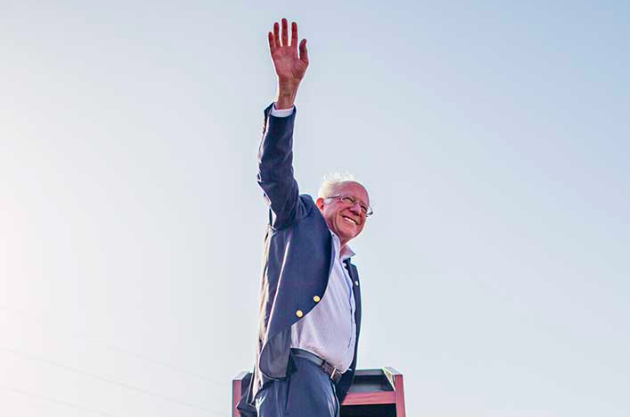
I have a theory about why the Democratic Party Establishment – folks like John Kerry and Hillary Clinton, among others, are so freaked out about Bernie Sanders.
It’s not because they think he might lose to Donald Trump. It’s because they fear he might win.

That fear has very little to do with the idea that his agenda will cost them and their allies and donors money, that he will raise taxes on the rich and take on the private health-care and Big Pharma industries or Bank of America and Goldman Sachs. No matter what Sanders does, Kerry and Clinton and the folks they work with will be comfortably rich the rest of their lives.
No, it’s something entirely different: These folks have been holding tremendous political power by running the Democratic Party, for decades – and if Sanders wins, that will end.
Sanders has spent his political career as in Independent. But if he wins the Democratic primaries, he’s the Democratic candidate for president – and if he wins the White House, he will be the de facto head of the Democratic Party in the United States.
And he will probably clean house.
If Sanders wins the presidency, the Democratic National Committee, which worked to sabotage his campaign against Hillary Clinton, will look nothing like it does today. Sanders allies will move to take power in state parties and local parties all over the country.
The Clinton-era folks will be gone.
Help us save local journalism!
Every tax-deductible donation helps us grow to cover the issues that mean the most to our community. Become a 48 Hills Hero and support the only daily progressive news source in the Bay Area.
They won’t be unemployed or in any financial distress – these are, by and large, people with substantial resources. But they will lose their grip on political power.
And that terrifies them.
Let’s take another look at what the Iowa results show, and what we might expect from the rest of the primary season.
For starters, Joe Biden probably won’t last past Super Tuesday, if he even makes it that far. But there are at least three candidates – five if we count Mike Bloomberg and Tom Steyer — who have the money and the organization to make it deep into the primaries, possibly all the way to the end.
Sanders, Elizabeth Warren, and Pete Buttigieg all made credible showings in Iowa, early returns suggest – enough for each of them to make the case that they are viable to donors. The difference between Buttigieg and Sanders is statistically minor and they will wind up with almost the same number of delegates, with Warren not far behind. (Interestingly, if you combined the Warren and Sanders vote, that candidate would be the prohibitive favorite.) Bloomberg has endless money of his own. If they are all still in the running after the primary season, it’s highly unlikely any of them will have 50 percent-plus-one at the convention.
There are no more “winner-take-all” states. “Winning” the Iowa caucuses or the New Hampshire primary puts a candidate a few points ahead of the others when it comes to assigning convention delegates. Unless the field is reduced to two finalists pretty soon, the numbers don’t support anyone winning a first-ballot nomination.
That, of course, changes everything.
After the first ballot, the delegates are released from their initial pledges and can vote for anyone they want. And the superdelegates (that’s the party establishment) come into play.
Typically, the actual selection of delegates for a candidate is pretty low-key. Four years ago, there were Sanders delegates and Clinton delegates from every Congressional district in California, and they all went to the convention, but we knew what would happen: The Clinton delegates would vote for the winner, and the Sanders delegates would vote for the loser, and the convention would be a coronation.
Just as it has been for most of our political lives.
But what happens if the people elected as Sanders or Warren delegates are suddenly in the position to vote for a second choice? What it the “Bernie or bust” folks suddenly get a role in choosing a nominee who is not Bernie? What if they can vote for Warren and make her the nominee?
(Again: It appears right now that if the people who voted for either Sanders or Warren could agree on one candidate, that person would be the nominee.)
What if the Warren supporters have to decide whether they will shift their votes to Sanders (which might put him over the top) or shift to a nominee who isn’t even in the field right now? (At a brokered convention, anyone can win, even someone who never entered a single primary.)
At that point, it really matters who the delegates are, and what kind of political judgment they have.
Something to think about.
